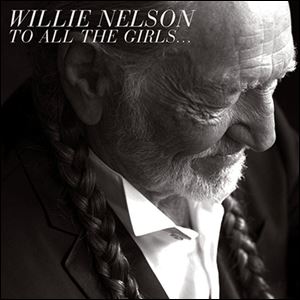
SOUNDS
More keepers than throwaways on Nelson’s ‘Girls’
10/23/2013
Willie Nelson performs at the 2012 CMT Music Awards in June, 2012 in Nashville, Tenn.
JOHN SHEARER/INVISION/AP

Willie Nelson performs at the 2012 CMT Music Awards in June, 2012 in Nashville, Tenn.

This CD cover image released by Legacy shows "To All the Girls," by Willie Nelson. (AP Photo/Legacy)
TO ALL THE GIRLSb71ad544-0fef-4ee2-903f-32b2788541a2
Willie Nelson (Sony Legacy)
Willie Nelson’s “To All The Girls.,” an album of duets with female partners, is custom-made for the download age. Few fans will connect with all 16 songs — the set is too eclectic and too inconsistent for that. But plenty of gold nuggets shine through for those willing to pick through the miscues and throwaways.
The second album of original material released this year by Nelson, and his fifth new album in three years, the ever-productive 80-year-old keeps pouring out new music, even when a little self-editing might make the individual packages stronger.
The gems on “To All The Girls” include a stunning multi-lingual duet with Alison Krauss on “No Mas Amor” (written by Keith Gattis and Sammy Barrett) and covers of Merle Haggard’s “Somewhere Between,” in an emotion-packed version with Loretta Lynn, and a swinging “Till The End Of The World” with Shelby Lynne.
On the other hand, Dolly Parton’s self-written contribution, “From Here To The Moon And Back,” suffers from over-sentimentality. A cover of the country chestnut, “Making Believe,” drags due to a lifeless reading by Nelson — a point driven home by how much more feeling duet partner Brandi Carlile brings to her part.
Nelson’s previous album, “Let’s Face The Music And Dance” — released just six months ago — is among 2013’s less-recognized highlights. Some selective care would have made “To All The Girls .” another strong outing, rather than one that alternately soars and sputters.
—MICHAEL McCALL, Associated Press

REMEMBERING O.V.
Johnny Rawls (Catfood Records)
When in doubt, return to the source.
In this case even though veteran blues singer Johnny Rawls was reluctant to tackle the work of his late mentor southern soul man O.V. Wright, he was talked into digging into a rich catalog that yields bona fide brilliance. Wright died at the age of 41 in 1980 and was considered a contemporary of Otis Redding, but his music never received the acclaim it deserved. With the exception of former J. Geils Band frontman Peter Wolf, who has covered Wright’s songs and never fails to cite him as an influence, he has been criminally under-appreciated.
"Remembering O.V." crackles with energy and funky soul. Horn arrangements punctuate Rawls’ gritty vocals, backup singers swell on the choruses and the instrumental work is pure Stax-era pop and soul. Highlights include the simmering hard funk of the opener "Into Something (I Can’t Shake Loose)," the sublime guitar work and message of "Nickel and a Nail," and the lone original "Blaze of Glory," that pays direct homage to Wright.
Rawls’ disc feels like a welcome artifact from another time, albeit one with pristine production standards, and answers the question, "Why don’t people make music this good anymore" with a resounding affirmation that they still do if you look hard enough.
— ROD LOCKWOOD

AIN'T NO MORE LOVE IN THIS HOUSE
Lou Pride (Severn Records)
The late Lou Pride, who died in June of 2012 at age 68, wasn't a household name even though he toured early in his career with B.B. King, Koko Taylor, and Kool and the Gang.
But he shows on this disc, a combination of four original songs and seven covers, he was a powerful soul singer and blues interpreter. A Chicago native rooted in gospel, Pride attended the church pastored by Nat King Cole's father as a child and once made such an impression on Curtis Mayfield that he recorded him.
Several other albums followed, this last one being a fine tribute despite a few uneven spots. Highlights include a personal favorite of Pride's, "Daddy Don't You Walk So Fast," as well as the title track, a heartfelt original, "We Can Do What We Want," and Pride's soulful take on "I Gotta Move On Up."
The latter was previously recorded by legendary Chicago blues guitarist-singer Luther Allison. Session musicians include Johnny Moeller of The Fabulous Thunderbirds on guitar.
—TOM HENRY